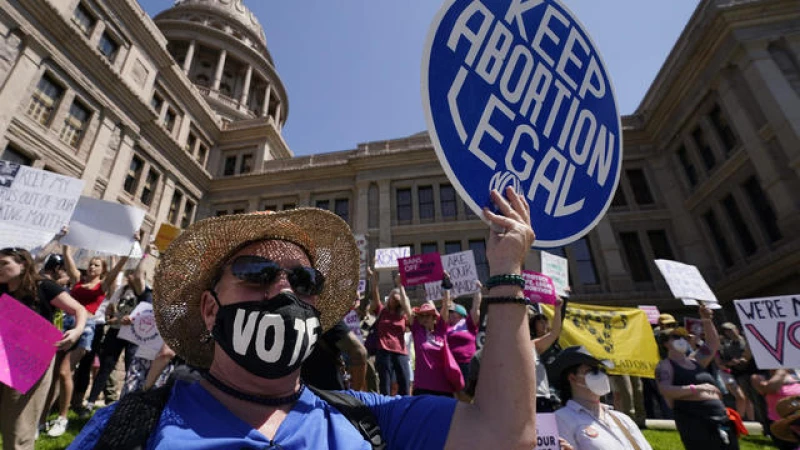Temporary Stay on Emergency Abortion Ruling in Texas
The Texas Supreme Court late Friday issued a temporary stay on a lower court ruling that would have allowed a woman to have an emergency abortion. The woman, Kate Cox, recently discovered that her unborn baby has been diagnosed with trisomy 18, a chromosomal disorder that is often fatal.
Cox, a mother of two from the Dallas area, and her husband sought the help of the Center for Reproductive Rights, who filed an emergency lawsuit on their behalf. The lawsuit aimed to grant Cox the right to terminate her pregnancy due to the severe medical condition of her baby.
However, Travis County Judge Maya Guerra Gamble ruled on Thursday that Cox could proceed with the abortion. This decision was later challenged by the state Supreme Court, which issued a temporary stay on the lower court's ruling.
The Center for Reproductive Rights expressed their concern over the delay in justice for Cox and her urgent need for medical care. Molly Duane, a senior staff attorney at the Center, stated, "While we still hope that the Court ultimately rejects the state's request and does so quickly, in this case we fear that justice delayed will be justice denied. We are talking about urgent medical care. Kate is already 20 weeks pregnant. This is why people should not need to beg for healthcare in a court of law."
Following Thursday's ruling, the Texas Attorney General's office issued a statement stating that the temporary restraining order "will not protect hospitals, doctors, or anyone else from facing civil and criminal consequences for violating Texas' abortion laws."
The Attorney General's office also included a letter sent to multiple medical centers outlining the actions it will take against doctors who perform abortions.
According to the lawsuit, a woman named Cox, who is currently 20 weeks pregnant, has visited three different emergency rooms in the past month. Her doctors have informed her that early screening and ultrasound tests indicate that her pregnancy is "unlikely to result in a healthy baby." Due to her two previous cesarean sections, continuing the pregnancy puts her at risk of "severe complications" that could endanger her life and future fertility.
The lawsuit claims that because of Texas' strict abortion laws, doctors have told Cox that their "hands are tied" and she would have to wait until the fetus dies inside her or carry the pregnancy to full term. In the latter case, she would have to undergo a third cesarean section, only to witness her baby suffer until death.
On November 28, Cox received the results of an amniocentesis, which confirmed that her fetus has a genetic condition called trisomy 18. This diagnosis means that her pregnancy may not last until birth, and if it does, her baby will be stillborn or survive for only a few minutes, hours, or days.
The Battle Over Texas' Abortion Ban Continues
A recent lawsuit has been filed in Texas as the State Supreme Court deliberates on the constitutionality of the state's strict abortion ban. The ban, signed into law by Texas Gov. Greg Abbott in 2021, prohibits abortions after approximately six weeks of pregnancy. However, there is a provision that allows for exemptions in cases of severe pregnancy complications.
The lawsuit was brought forward by women who were denied abortions despite experiencing extreme complications during their pregnancies. They are seeking clarification on the medical exemptions allowed under the ban. Earlier this year, an Austin judge ruled that women with severe complications could be exempt from the ban, but the ruling is currently on hold pending the Supreme Court's decision.
In the ongoing arguments before the state Supreme Court, the state's lawyers have suggested that a woman who receives a fatal fetal diagnosis during pregnancy could potentially bring a lawsuit under that specific circumstance.
Texas has gained a reputation for having some of the strictest abortion laws in the country. In addition to the ban on abortions after six weeks, a "trigger ban" went into effect following a 2022 Supreme Court ruling that made it a felony for doctors in the state to perform an abortion unless the life of the patient is in danger.
The outcome of this lawsuit will have significant implications for the future of reproductive rights in Texas.
Emergency Abortion Denied: A Testimony
Lead plaintiff Amanda Zurawski, who attended President Biden's State of the Union address this year as a guest of first lady Jill Biden, testified that she was denied an emergency abortion when her water broke when she was just 18 weeks pregnant. She said she suffered from multiple medical complications and knew she would miscarry, but doctors initially told her they could not induce labor because the fetus still had a heartbeat.
After developing sepsis three days later, doctors finally performed an induction abortion. As a result of two bouts of sepsis, she said one of her fallopian tubes has closed permanently, and she has had to undergo several procedures to reconstruct her uterus. She said her doctor told her that the only way she could get pregnant again was through IVF. Since then, Zurawski has undergone three egg retrievals, but she and her husband still have concerns about a future pregnancy.
What is trisomy 18?
According to Cox, her amniocentesis revealed her fetus suffered from trisomy 18, meaning it had three copies of chromosome 18 instead of two. According to the Cleveland Clinic, heart problems are present in 90% of babies born with trisomy 18, as well as kidney disease, breathing abnormalities, gastrointestinal tract and abdominal wall issues, birth defects and spinal problems.






